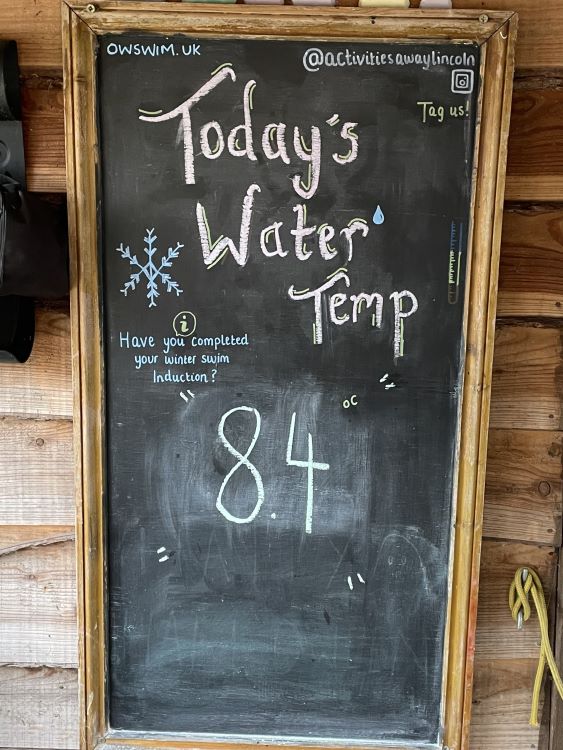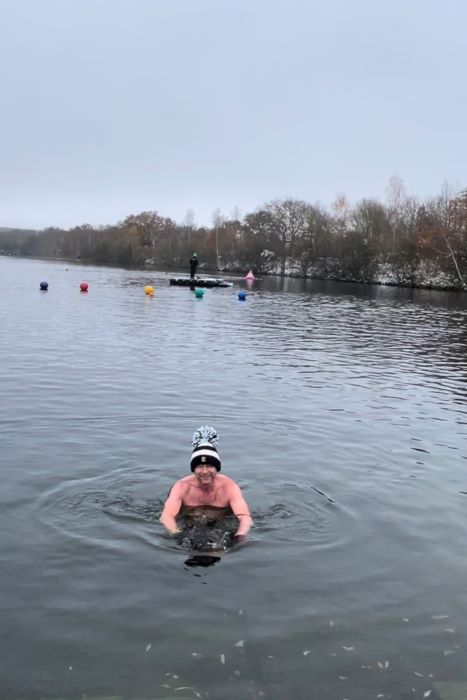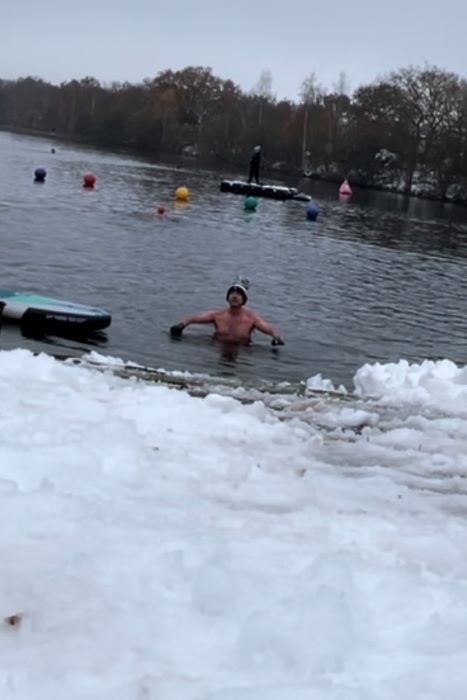Is It Worth The Pain?
January is usually the month of the year when the water temperature of lakes and rivers drops to its coldest. So, it’s the perfect moment for Christmas and New Year to have brought open water swimming to widespread public attention! You may have taken part in a festive dip or plunge yourself, may have seen them on TV, pictures of them in news stories or on your social media feed? Equally, there will have been New Year sales of ice baths and you may have pondered purchasing one or know someone who did.

All this attention may make you wonder what the health benefits are of immersing yourself in cold water in your garden or taking a swim at a local lake.
I have read various articles on the health benefits of cold-water therapy and whilst I was driving to work, there was a really good review of them on ‘Sliced Bread’ (a BBC Radio 4 programme) which aims to research the science behind current trends and decide if they are best thing since ‘Sliced Bread’ or just marketing ‘BS’.

They spoke to Professor Mike Tipton from the University of Portsmouth who gave his views. So, in this blog, I’ll share his thoughts on cold water therapy or cold-water immersion and the benefits of them whether it’s a cold-water bath in your garden or even an open water swim. Below are ten questions you may have asked yourself – with hopefully some useful and informative answers.

How cold does the water need to be?
The suggestion is that water between 10C and 15C is cold enough for the body to achieve the cold-water physiological response. We are after all a tropical animal and taking the animal that wants to be at 26C and putting it in 12C water provides a significant effect. When you go below this you have increased risk with the potential of cold shock.
Do we have to breathe in certain way?
There are so many different breathing techniques which we do not need to worry about. The most important thing is to try and get our breathing back under control as soon as possible. Sadly, it is this loss of control of breathing which is the biggest factor in deaths when people fall into cold water.
How long do you have to stay in the water for health benefits?
The most profound effect of the cold is when you first get in the water. If you stay in an ice bath for longer, you just cool the tissues under the skin which can lead to incapacitation and difficulty getting out of the bath with potential of a trip or fall when you get out. So, there are not thought to be any proven health benefits gained the longer you remain in the water.
Does a chilly plunge boost your energy levels?
You may feel like it does, as the results of being in the cold, is your body releases a lot of stress hormones such as cortisol, adrenaline, noradrenalin which are designed to help you run away or fight.
Does it help you sleep?
We often start to shiver uncontrollable which is your muscles working but not in the controlled fashion of when we exercise. This is tiring for the body; makes you feel exhausted in the evening and hence can help you sleep.
Does it help you recover from exercise?
There is mixed research on this. However, there is found to be a reduction in delayed onset muscle soreness (DOMS) if you have exercised and then take a cold-water dip. There is some evidence for reduced muscles damage and the recovery of muscle strength. There is little research which show the cold water is any more effective than an active cool down after exercise. However, at the same time it does hinder the effect of strength training. When we are strength training, we are looking to damage the muscles, so it grows back stronger. If you take a cold dip after exercise, there is less muscle damage, so they do not grow back stronger and bigger and hence smaller long term muscle gain.
Does it help with circulation?
There is no evidence that cold water helps circulation as when we go in cold water our body shuts down the circulation to our hands and feet to protect our core body temperature. In fact, you can damage the skin at our extremities.
Does it help the immune system?
There are studies in both directions on the improvement in the immune system. There have been studies which show there are fewer upper respiratory tracts infections for cold water swimmers but the same is true for swimmers in general.
Does it boost your metabolism and help weight loss?
It does boost your metabolism through the shivering you do which is a form of exercise, however it is arguable is that it is any better than general exercise.
Does it improve mental health?
The number one benefit of cold-water immersion from a range of studies is the positive impact on mental health due to release of serotonin and other stress hormones. You also get ‘green and blue therapy’ when you swim in the outdoors alongside the actual exercise.

I really enjoyed this radio programme as I have always been intrigued by the possible impacts of open water swimming. My anecdotal information from the last three years is that I’ve had less colds and flu since I’ve been open water swimming and I’ve certainly found that it helps my mental health. I am considering buying a bath for the garden, but I do not think I will be adding ice to the water or staying in it for longer than a few minutes.
I wonder what you think!
Main – Photo by Ian M Jones on Unsplash
References
Sliced Bread on ice baths presented by Greg Hands can be found on BBC Sounds: https://www.bbc.co.uk/sounds/play/m001s5hc?partner=uk.co.bbc&origin=share-mobile



